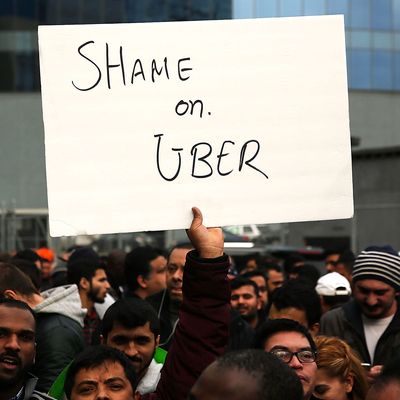
The sudden wave of protest and dissent that swept up thousands of Americans this past weekend led normally politically apathetic people to do many things that they’d never usually do: march, chant, make signs, protest, voluntarily travel to JFK Airport, and, maybe most surprising of all for a particular class of young urban professionals, delete their Uber accounts.
To recap: On Saturday, the New York Taxi Workers Alliance announced an hour-long work stoppage between 6 and 7 p.m. for rides to and from JFK airport. Shortly after 7:30, after the stoppage had ended, Uber’s NYC presence tweeted that surge pricing had been turned off near JFK — something Uber often does during delays caused by newsworthy events to avoid the perception of being price gougers. The end result, however, was that Uber was perceived as breaking a strike. That Uber was turning off surge pricing — thereby making JFK less attractive to drivers using Uber, and in that sense the closest thing to a work stoppage Uber can call on its decentralized, non-union platform — didn’t seem matter; the fact that it tweeted about doing business around JFK at all (combined with CEO Travis Kalanick’s presence on Trump’s business advisory board) was enough to launch an ad-hoc campaign: #DeleteUber.
It’s unclear how many people actually deleted Uber, but it was enough to get the hashtag trending, induce a response from Kalanick, and prompt the company to buy ads on Instagram, Twitter, and Facebook touting the company’s (commendable) commitment of funds to compensate Uber drivers trapped out of the country by President Trump’s sudden executive order. Maybe most stinging of all was the good publicity that Uber’s archrival Lyft was able to milk by almost immediately pledging a million dollars to the ACLU. All in all, it was not the weekend Uber might have hoped for.
At Axios, tech reporter Dan Primack argues that “Uber didn’t deserve #DeleteUber.” To the extent that #DeleteUber is understood as a direct response to this weekend’s events, that might be true: The company wasn’t technically scabbing; its tweet was an ill-advised blunder; and it was likely actually slowing down work around JFK, albeit not in direct solidarity. But it’s probably better to understand #DeleteUber less as a reaction to the company’s actions this weekend and more as the culmination of years of complaint and criticism about Uber, finally coming to a head in a new, highly charged political moment.
Since its inception, every positive story about Uber has been countered with a negative one. It may be convenient, cheap, and revolutionary in certain ways, but it refuses to treat full-time workers as employees and resists unionization (it’s not an accident that #DeleteUber appeared at a moment of clear contrast between Uber’s precariat workforce and the organized NYTWA); it uses billions of dollars raised from investors to defy and dismantle regulation; it subsidizes rides at rates that, while cheaper than a yellow cab, are not sustainable in the longer term. (Interestingly, the most strenuous anti-Uber propagandists might be the app’s drivers themselves. Anecdotally, at least, drivers who use more than one ride-share app tend to openly complain about Uber’s cut, and are more than willing to encourage their riders to use Lyft, Gett, or Juno.)
But in a world where the arc of the moral universe appears to be bending rapidly in the correct direction, it’s easier for people to shut out those criticisms and enjoy the convenience of a ride-hailing app. In a world where even Uber’s middle-class-professional base feels threatened, it’s much harder to rationalize away compromises.
Especially when it comes to ride sharing. Uber’s strategy hinges on making users reliant on its service, and creating the largest network of drivers. But without the network, it has no particular advantage over its competitors, and in big cities the wait times for Lyft and Uber are often equivalent. For those people, deleting Uber means no loss of service or disadvantage.
But users switching to Lyft are just moving to a company that’s no better than Uber on the issues that Uber-deleters care about. Lyft, which counts Trump transition-team member Peter Thiel among its stakeholders, employs a strategy similar to Uber, subsidizing rides to undercut yellow-cab drivers and operating at a loss to rope users in. And it is similarly resistant to classifying full-time drivers as employees — it just happens to not have accidentally inserted itself into a moment of enormous political action.
That the most notable consumer-level rejection of Uber (as opposed to resistance in the form of government regulation) came on the heels of what was essentially a communications blunder is telling. Amidst immense political and social upheaval, the transition from Obama to Trump has been like replacing a soft-light bulb with a fluorescent one: It’s much harder to ignore blemishes. For people galvanized by Trump’s election, and subsequent actions, willingness to forgive big, rich companies small blunders is no longer in abundance. And while Lyft might be enjoying its moment as the seemingly virtuous alternative, it’s only a matter of time before the spotlight shines on it, too.





























